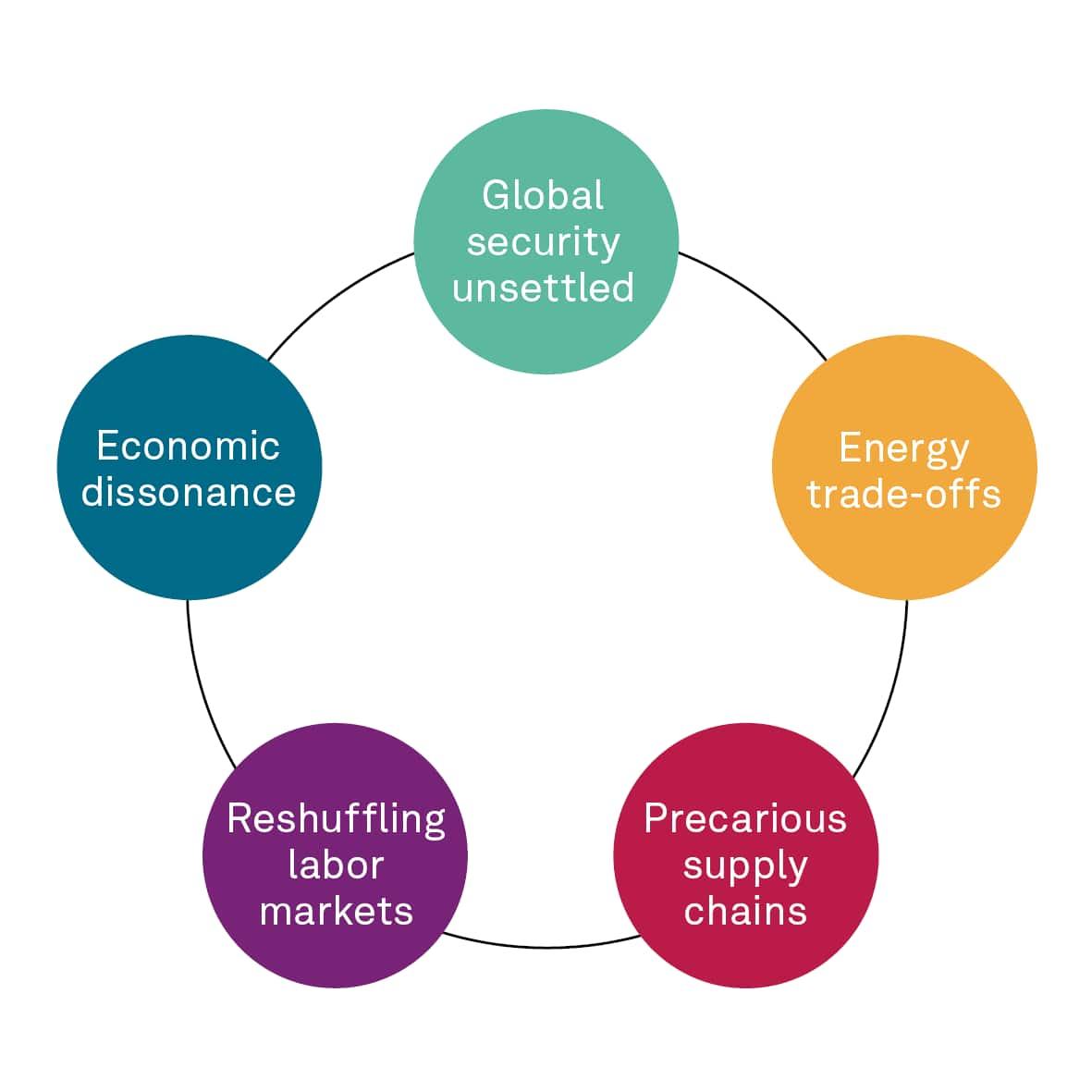Customer Logins
Obtain the data you need to make the most informed decisions by accessing our extensive portfolio of information, analytics, and expertise. Sign in to the product or service center of your choice.
Customer Logins
BLOG
Sep 14, 2023
G20 Summit in India
India, the current president of the Group of 20 (G20), hosted the G20 Leaders' Summit in New Delhi from Sept. 9 to Sept. 10. The summit began with a unanimous Leaders' Declaration, where participants affirmed the G20 as the "premier global forum for international economic cooperation." Russian President Vladimir Putin and Chinese President Xi Jinping did not attend the summit; both sent representatives instead.
The Indian government will almost certainly seek to advance recognition among member governments of India representing concerns of the "Global South," given the signing of the Leaders' Declaration and after admitting the African Union (AU) as a permanent member. G20 meetings held earlier in 2023, particularly meetings of central bank governors and finance ministers, failed to produce joint statements.
The signing during this summit of a Leaders' Declaration will be presented by the Indian government as evidence of its ability to act as a bridge between advanced and emerging economies — a key pillar of India's geopolitical strategy. The New Delhi Declaration includes a "preamble" referring to the ongoing war in Ukraine without naming Russia (a difference from the Indonesia-led 2022 declaration). The Declaration also includes commitments to climate financing, global food security and multilateral reform, all of which represent concerns of the Global South. The Indian government is likely to cite these outcomes despite differences between itself, mainland China, Russia and the United States (among other members) as an example of its mediating power.

Where differences emerge
The extent of difference among members points to limited actionable outcomes for climate financing. The New Delhi Declaration states that 2023 will be the first year that developed countries would meet their annual commitment of providing US$100 billion in climate finance to developing countries (first promised in 2010). Meeting this pledge will face challenges including that EU member countries, the US and Japan are likely to focus on financing domestic energy needs and fiscal expenditure (in the context of the Russia-Ukraine war), with priorities for external climate financing subject to change in response to election outcomes in these countries over the course of the next one to three years. The Declaration only made references to operationalize the loss-and-damage fund first proposed at COP27 in 2022 and for addressing debt vulnerabilities in low- and middle-income countries. The absence of confirmed outcomes is indicative of differences between member countries, which will likely influence negotiations at COP28 to be held in the United Arab Emirates in November 2023.
Similarly, although the Leaders' Declaration committed to multilateral institutions' reform, outcomes will vary across forums given divergent interests. The New Delhi Declaration called for "more inclusive and reinvigorated multilateralism," also indicating the need for multilateral institutions to be more representative. Accordingly, the Indian government will very likely continue negotiations to reform the Permanent 5 (P5) of the United Nations Security Council, for itself to be included as permanent member. This position will be supported by Brazil, which is also seeking its inclusion in the P5 and will hold the G20 presidency in 2024, indicating continued momentum for multilateral reform beyond India's term.
Disagreements between incumbent permanent members mean a tangible shift in the P5 composition is unlikely in the one- to two-year outlook. This implies continuity in the UN's diplomatic approach to interstate conflicts. The Declaration also committed to a "fully and well-functioning" World Trade Organization (WTO) by 2024 — where the Appellate Body (AB; the apex body for dispute settlement) has been suspended since 2019, following the US' decision to not nominate members. International media report that 24 appeals are pending at the AB, and negotiations for restoring the AB are likely at the WTO's Abu Dhabi Ministerial Conference in February 2024. The US, however, is unlikely to nominate members to the AB despite lobbying from developing countries to do so, with its position regarding the AB receiving domestic bipartisan support.
Learn more about our geopolitical insights
This article was published by S&P Global Market Intelligence and not by S&P Global Ratings, which is a separately managed division of S&P Global.
{"items" : [
{"name":"share","enabled":true,"desc":"<strong>Share</strong>","mobdesc":"Share","options":[ {"name":"facebook","url":"https://www.facebook.com/sharer.php?u=http%3a%2f%2fssl.ihsmarkit.com%2fmarketintelligence%2fen%2fmi%2fresearch-analysis%2fg20-summit-2023-highlights-india.html","enabled":true},{"name":"twitter","url":"https://twitter.com/intent/tweet?url=http%3a%2f%2fssl.ihsmarkit.com%2fmarketintelligence%2fen%2fmi%2fresearch-analysis%2fg20-summit-2023-highlights-india.html&text=G20+Summit+in+India+%7c+S%26P+Global+","enabled":true},{"name":"linkedin","url":"https://www.linkedin.com/sharing/share-offsite/?url=http%3a%2f%2fssl.ihsmarkit.com%2fmarketintelligence%2fen%2fmi%2fresearch-analysis%2fg20-summit-2023-highlights-india.html","enabled":true},{"name":"email","url":"?subject=G20 Summit in India | S&P Global &body=http%3a%2f%2fssl.ihsmarkit.com%2fmarketintelligence%2fen%2fmi%2fresearch-analysis%2fg20-summit-2023-highlights-india.html","enabled":true},{"name":"whatsapp","url":"https://api.whatsapp.com/send?text=G20+Summit+in+India+%7c+S%26P+Global+ http%3a%2f%2fssl.ihsmarkit.com%2fmarketintelligence%2fen%2fmi%2fresearch-analysis%2fg20-summit-2023-highlights-india.html","enabled":true}]}, {"name":"rtt","enabled":true,"mobdesc":"Top"}
]}




